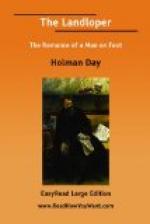“Look all around at the graves,” said Etienne, tears in his wrinkles. “I know something better since I take off that faucet. Not all the martyr die when the lion eat ’em up and the fire burn ’em; there be some martyr these day, too. And sometimes, mebbe, some man what have the power will come here and see all these poor little grave and then he go and choke the lion what eat all these poor childs.”
“What kind of man would that be?” pondered Farr. At that moment he had little faith—much less faith than usual—in the decency of any human being; and for many years his faith in humankind had been expressed by a contemptuous snap of his finger.
To sit there longer and look at that fresh earth with the pathetic toys sprinkled over it was a torment his soul could not endure.
He arose and hurried away and Etienne followed him. They trudged in silence back to the city—Etienne to take his rake and pike-pole from the hands of the man who had substituted at the rack, and Farr to resume surly domination over his sweating Italians.
“The martyrs,” Etienne had called them. The notion of that stuck in Farr’s brooding thoughts.
He tried to look deeper into his own heart than he had ever looked before and explain to himself just what motive had attracted him to the child in the first place; he had never been especially interested in children before. He found himself muttering, “And a little child shall lead them,” without understanding just why this child had led him so strangely.
If one Walker Farr had understood it at all and had been able to explain it to himself, he would have penetrated the mystery of the dynamics of love—the great gift to humanity that God has not seen fit to expose in its inner workings. Therefore, Farr strode here and there in the hot sun, spurred his diggers with crisp oaths, and on the heels of his profanity muttered to himself, “And a little child shall lead them.”
The tile boss of the Consolidated, whose crew was following the trench-diggers, accosted Farr, after several inspections of his lugubrious countenance.
“Don’t you think you need to be cheered up a little?”
Farr scowled at him.
“I don’t know what has disagreed with you, but you’re certainly in a bad way,” pursued the boss. “Go up with the crowd to City Hall to-night and hear ’em open up the police scandals. Plenty of free fun for the heavy-hearted! There are about half a dozen fat cops in this city who’ll be fried to a crisp on both sides, and the sound of the sizzling will be pleasant in the ears.”
“I’m not interested.”
“You will be, if you tend out. The hearing is before the mayor and the whole city government. Nothing very hefty in the way of charges—only loafing in beer-coolers during the heat of the day, spending their time chasing the labor-agitators out of the parks, and letting burglars keep house all summer in the mansions up-town while the owners are away at the seashore. It’s all more or less of a joke.”




